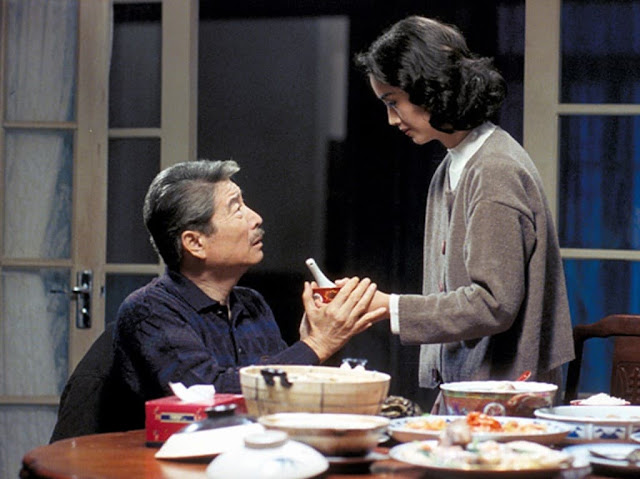Eat Drink Man Woman
Food as a metaphor can be as simple as any biological desire/necessity or more multifaceted as its role in bringing folks together. While 1994's EAT DRINK MAN WOMAN is based on a quote by Confucius in favor of the former, writer/director Ang Lee has made a film more interested in the latter. It is no spoiler to inform you that the characters here will bond over several shared meals. But, as someone else said, man cannot leave on bread alone (indulge me here). Food may bring everyone to the table and provide sustenance, but can it alone foster connections?
Mr. Chu (Sihung Lung) is a widowed, celebrated master chef who prepares sumptuous meals nightly for his three grown daughters, Jia-Jen (Kuei-Mei Yang), Jia-Chien (Chien-lien Wu), and Jia-Ning (Yu-Wen Wang), with whom he lives. "Sumptuous" is no exaggeration; these are almost indescribable feasts which certainly provide generous leftovers. There is a running joke as Chu always begins the suppers with "I didn't prepare much..." Lee presents these Asian dishes in near pornographic fashion. There is sheer fascination in their preparation. Utterly mouthwatering.
Chu isn't the warmest sort, so it is surmised that his meticulously crafted meals are his way of showing love to his family. But it is apparent that all is not content among them. Jia-Chen is headstrong and has a good corporate gig, but she really wanted to follow in her father's footsteps, something he subsequently dismissed. Jia-Chen is a schoolteacher who hasn't found Mr. Right yet, and is repeatedly reminded by just about everyone. She is also the only family member to convert to Christianity. Jia-Ning is still in college and dating her friend's sometime ex-boyfriend. She will make a big announcement one night at the table that will raise eyebrows.
Actually, all four of them will have such a moment, each that will forever change the family dynamic. How will food play a role in all of this?
EAT DRINK MAN WOMAN suffers a bit of schizophrenia. In moments it plays like genuine examination of another culture; elsewhere it feels like a Hollywood rom-com. I liked the characterizations, though sometimes they followed the mandates of script contrivance. I wish the screenplay, penned by Lee, Hui-Ling Wan, and frequent Lee collaborator James Schamus, had been leaner. There are simply too many characters and scenarios. Jia-Ning, the youngest of the daughters, wasn't really necessary to the story. Her bits only add to the runtime. Mr. Chu's big revelation late in the movie also felt a bit ridiculous, though highly amusing. Perhaps it is in line with the sort of humor found in certain Asian films? Too bad the follow up scenes don't sufficiently acknowledge the tsunami of emotion unleashed there.
But Lee's film is lovely and charming. Quite gentle. It is enjoyable to spend time with these people. You ponder the food metaphors as you just about succumb to the parade of delicacies and order some Chinese, if you can find any good such food anymore if you are in the U.S.A. Maybe some viewers will be inspired to create their own.



Comments